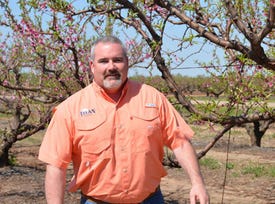
To illustrate the challenge agriculture faces finding labor, Ridge Spring, SC, peach farmer Chalmers R. Carr III tells the story of a talk he made to a local Republican Women’s club.
“They were concerned about immigrant labor and why we needed them so I asked them which one of you is raising your children to do farm labor,” Carr says. “Not a single one raised their hand.”

Chalmers R. Carr III says Titan Farms has been successful with immigrant labor because he, his wife Lori Anne and his farm mangers work hard to take care of the workers and treat them like extended family.
Carr uses this as one example to show that Americans aren’t willing to do farm labor and that a permanent guest worker program is needed to maintain and bring in foreign labor that is willing to do the work.
He says the country needs a more flexible program that allows legal immigrants to work on farms year-round with the opportunity to renew their work visas every 12 – 24 months. These permits are also needed so undocumented farm workers, who make up most of agriculture’s work force, can come out of the shadows without fear, he stresses.
As the president and CEO of Titan Farms, the nation’s second largest peach farm, Carr is recognized nationally and in Washington, D.C. as an expert on immigration issues. He helped draft and negotiate the Senate immigration bill in 2013 and has testified before Congressional panels on immigration.
“I have a strong background in agriculture and I have worked with migrant labor since I was 11 years old,” Carr explains. “I know it best from the guest worker standpoint because I have worked within the H-2A program for the past 17 years. Just two percent of the producers use this program, but the majority of those who don't are worried about their current work force. Because we’re in the H-2A program, we do not have those same worries. I get a 90 percent return rate on my workers each year. They go home to Mexico, present their travel documents and then wait to come back the next year. They abide by the rules; we abide by the rules.”
Carr says it is critical for all of agriculture to have a permanent guest worker program so farms of all sizes can find and maintain labor and to ensure this an ample supply of agricultural workers in future years.
He believes the rhetoric needs to be toned down as people face the facts that the United States will continue to rely on foreign laborers to work on farms.
“We have a huge dilemma facing our country’s supply of fresh fruits and vegetables,” Carr explains. "Americans need to realize that our food is going to be harvested by foreign workers. But where will that food be harvested? It is important to me to provide fresh fruits and vegetables to my family that have been grown and harvested in the United States under the watchful eye of the USDA and other regulatory agencies rather than in a foreign country where such controls are not so stringent.”
Carr says agriculture has a real issue with immigration and it is time for the country to move forward on the issue.
No amnesty
“The House has taken a position to pursue enforcement only legislation. An enforcement only bill would put our country in grave danger because we know that an estimated 75 percent of our workers in the agriculture industry are fraudulently documented. You can’t have a bill with enforcement only; you must have provisions for guest workers.”
Carr makes it clear that he doesn’t support amnesty. “I don’t like the word ‘amnesty,’ but for the current work force there has to be away for those workers who have not broken any laws other than their illegal presence in the US to be able to adjust their status and remain gainfully employed. The workers should be able to receive temporary work status by coming out of the shadows, pay a fine and pay taxes. With a 5.5 percent unemployment rate, it is imperative that these workers remain in this country to harvest the crops that feed us all.”
Carr does not support citizenship for guest workers, but he stresses that there should be a common sense method for retaining good immigrant workers and for bringing in additional legal workers who are willing to do the jobs Americans won’t do.
Carr started with 175 H-2A workers in 1999. As the business grew, he has expanded his immigrant workforce. This year, during the peak summer harvest season he will have approximately 540 workers. Titan Farms utilizes the H-2A workforce in the packing facility grading, sorting and shipping peaches and vegetables as well as in the field performing various tasks related to harvesting the peach, bell pepper and broccoli crops.
Regulations governing the H-2A program require users to reimburse any charges incurred by a worker for transportation from his home to the farm along with a daily subsistence charge. Lodging for guest workers and hourly base wages are also regulated for program participants. In South Carolina the wage rate is $10 per hour.
Carr says Titan Farms has been successful with immigrant labor because he, his wife Lori Anne and his farm mangers work hard to take care of the workers and treat them like extended family. “They work very hard and they have helped to build this company right beside me.”
About the Author(s)
You May Also Like






